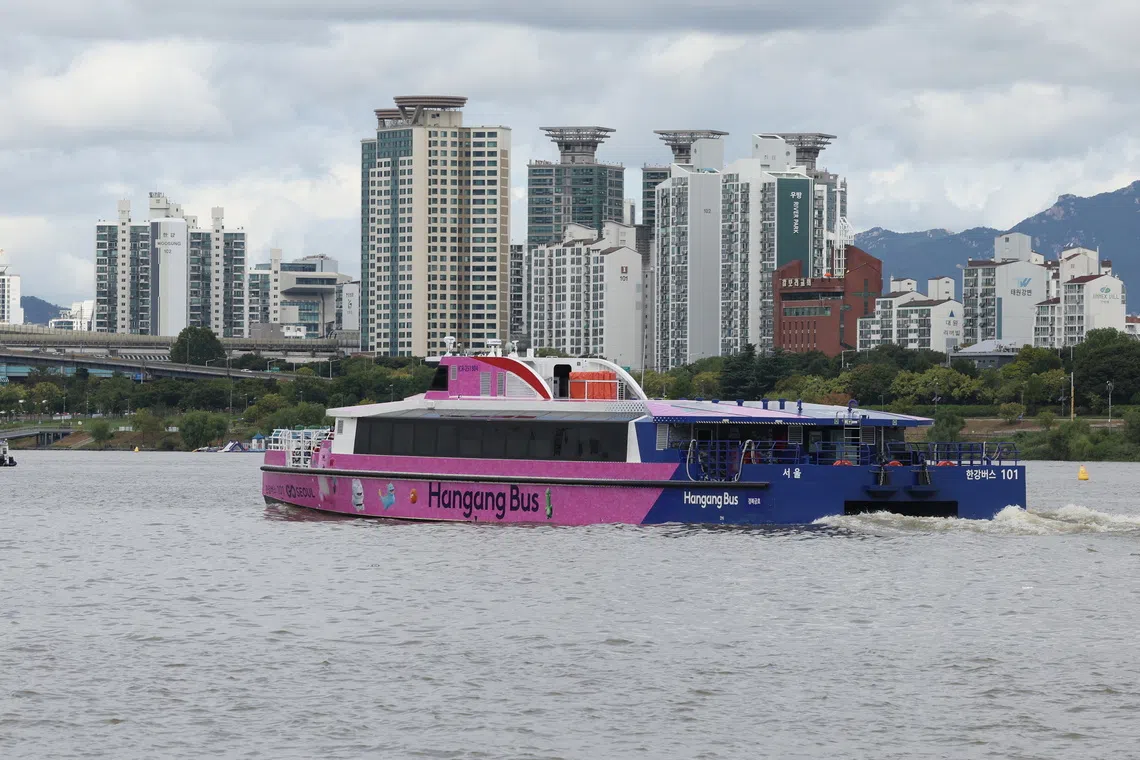Seoul authorities apologise over suspension of water bus service 10 days after launch
Sign up now: Get ST's newsletters delivered to your inbox

Doubts have been expressed about the project’s practical value upon considering accessibility to other public transportation options.
PHOTO: EPA
Follow topic:
SEOUL – Seoul mayor Oh Se-hoon’s project, 19 years in the making, suspends operation, citing unforeseen problems
Just 10 days after officially launching its service, the Hangang Bus – a ferry set to ply Seoul’s main river – has suspended operation to begin no-passenger trial runs from Sept 29 through the end of October.
The Seoul Metropolitan Government apologised on Sept 29 that its new waterborne public transportation system was no longer available to the public after its launch on Sept 18
“I sincerely apologise for the disappointment and inconvenience caused to Hangang Bus users,” said Mr Park Jin-young, head of the city government’s Future Han River Headquarters, in a press briefing at Seoul City Hall in Jung-gu, central Seoul, on Sept 29.
The city government official explained that the decision was made due to unforeseen problems.
“We previously conducted a six-month trial operation – three months without passengers and three months with passengers – and there were no major issues with the vessel operations,” the official explained.
According to Mr Park, a few malfunctions, mainly concentrated in the rudder, engine and radar systems, were identified ahead of the official launch.
“We confirmed that there were no operational problems after taking corrective measures, which made us confident about starting the Hangang Bus service. But due to fatigue and stress on the vessels, problems beyond our predictions occurred,” Mr Park added.
Asked whether the official launch schedule had been hasty, Mr Park responded, “The operation was originally scheduled for October last year, and we decided to spend an additional year for testing. We did not consider the timeline rushed or unreasonable.”
The city government insisted that it plans to complete all tests within a month to the best of its ability, emphasising that the tests will be sufficient to prevent minor technical malfunctions and loss of public trust.
The river bus system is to operate a 28.9-km route through seven docks: Magok, Mangwon, Yeouido, Jamwon, Oksu, Ttukseom and Jamsil.
But the Hangang Bus faced temporary suspension
The Hangang Bus was a major flagship project of Seoul mayor Oh Se-hoon, who believes the ferry can become an attractive new source of public transportation that enhances the commuting experience.
But the Seoul mayor has faced criticism since the Hangang Bus was first announced as part of Oh’s “Hangang Renaissance Project” to redesign and create a riverside cultural space along the Han River, during his first term in 2006.
Doubts have been expressed about the project’s practical value upon considering accessibility to other public transportation options. They also referred to vulnerabilities to climate change and the river freezing.
Ruling Democratic Party of Korea lawmakers have recently contended that the Hangang Bus project should be abandoned.
“Seoul residents have another problem to worry about. How much more money will be spent on this additional one-month trial operation? Oh Se-hoon’s project is like a bottomless pit where the people’s taxes are spent. It needs to be abandoned before even more is wasted,” said Representative Park Hong-keun of the Democratic Party on social media on Sept 29.
Representative Jeon Yong-gi, another Democratic Party lawmaker, raised the additional concern that the Hangang Bus service did not verify passengers’ identities, creating a potential safety risk in the event of maritime accidents.
According to Jeon, the Act on the Use and Safety Management of Ships stipulates that the operators of ships traveling more than 3.7km or operating for over one hour must verify passenger identity.
But the Seoul Metropolitan Government has not been following these procedures, citing a provision in the law that allows exceptions at the discretion of the governing authority.
The lawmaker quoted the Ministry of the Interior and Safety as saying that the city government’s decision “is deemed a legitimate administrative action. But given that many passengers use the Hangang Bus and the severe consequences of maritime accidents, it is necessary for the Hangang Bus to uphold the requirements for boarding reports and ID verification without exception”.
“Even though other local governments are also allowed exceptions under the same law, they still comply with the rules to protect the safety of passengers. Is Mayor Oh’s vision more important than the safety of Seoulites?” the lawmaker said in a press release on Sept 29.
But Ms Chae Su-ji, a Seoul Metropolitan Council member of the main opposition People Power Party, countered that the Seoul mayor made the responsible choice for the people even though the Hangang Bus had scored a remarkable achievement by garnering approximately 25,000 passengers within just 10 days.
“It is very unfortunate that the service had to be suspended due to some minor problems. Although heavy criticism was expected, Mayor Oh made a courageous decision to suspend the passenger service and chose to proceed with a no-passenger trial operation for the sake of public safety.” THE KOREA HERALD/ASIA NEWS NETWORK

